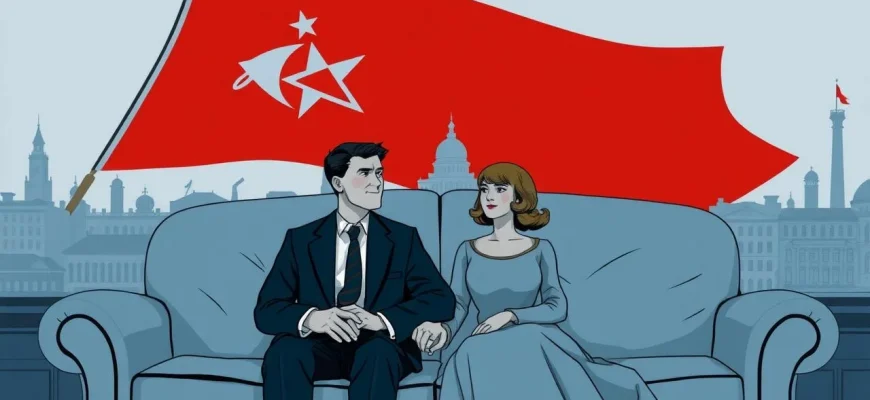Soviet cinema has always been a treasure trove of stories that reflect the societal norms, values, and challenges of its time. This curated list of Soviet films focuses on the theme of marriage, showcasing how this institution was portrayed, questioned, and celebrated in the USSR. From comedic takes to dramatic narratives, these films provide not only entertainment but also a window into the Soviet understanding of love, commitment, and family life, making them invaluable for anyone interested in cultural studies or simply looking for a unique cinematic experience.

The Irony of Fate, or Enjoy Your Bath! (1975)
Description: This New Year's Eve classic follows a man who, due to a mix-up, ends up in the wrong city and in the apartment of a woman who looks exactly like his fiancée. The film humorously explores the concept of fate and the unexpected twists in relationships, making it a perfect fit for our marriage-themed collection.
Fact: The film is traditionally shown on Russian television every New Year's Eve. It was also remade in 2007 with the same title.
 30 Days Free
30 Days Free 
The Cranes Are Flying (1957)
Description: This poignant war drama tells the story of a young couple whose love is tested by the horrors of World War II. It delves into the themes of separation, fidelity, and the impact of war on personal relationships, making it a profound exploration of marriage in times of crisis.
Fact: The film won the Palme d'Or at the 1958 Cannes Film Festival, making it one of the most celebrated Soviet films internationally.
 30 Days Free
30 Days Free 
A Cruel Romance (1984)
Description: Based on Alexander Ostrovsky's play "Without a Dowry," this film examines the life of a young woman in 19th-century Russia, exploring themes of love, marriage, and social status. It's a tragic tale of how societal expectations can dictate personal happiness.
Fact: The film was nominated for the Golden Prize at the 14th Moscow International Film Festival.
 30 Days Free
30 Days Free 
The Diamond Arm (1969)
Description: A comedy about a man who inadvertently becomes involved in a smuggling operation, this film uses humor to explore the dynamics of marriage and family life, showcasing how ordinary people can find themselves in extraordinary situations.
Fact: The film's catchphrases have become part of everyday Russian language, and it's one of the most quoted Soviet comedies.
 30 Days Free
30 Days Free 
Office Romance (1977)
Description: This romantic comedy revolves around an office where a strict boss and her subordinate fall in love, highlighting the complexities of workplace relationships and the societal pressures surrounding marriage.
Fact: The film was a massive hit, leading to a sequel in 1982 titled "Office Romance. Our Time."
 30 Days Free
30 Days Free 
The Pokrovsky Gate (1982)
Description: Set in the 1950s, this film humorously depicts the lives of residents in a Moscow communal apartment, focusing on the relationships and marriages within this microcosm of Soviet society.
Fact: The film's setting and characters have become iconic, representing a nostalgic look at Soviet life.
 30 Days Free
30 Days Free 
The Unforgettable Year 1919 (1952)
Description: This film tells the story of a young couple during the Russian Civil War, exploring how war and revolution affect personal relationships and the institution of marriage.
Fact: The film was one of the first Soviet films to be released with English subtitles, making it accessible to international audiences.
 30 Days Free
30 Days Free 
The Gypsy (1967)
Description: A story of love and cultural clash, this film follows a Gypsy woman who marries a Russian officer, examining the challenges of intercultural marriage in Soviet times.
Fact: The film was banned in the Soviet Union for a time due to its portrayal of Gypsy culture.
 30 Days Free
30 Days Free 
The Very Same Munchhausen (1979)
Description: While not directly about marriage, this satirical film uses the character of Baron Munchhausen to explore themes of truth, reality, and the absurdity of life, which can be seen as a metaphor for the complexities of marital relationships.
Fact: The film was a critical success, winning multiple awards at the 1980 All-Union Film Festival.
 30 Days Free
30 Days Free 
The Heart of a Dog (1988)
Description: Based on Mikhail Bulgakov's novella, this film uses dark comedy to explore themes of identity, transformation, and the absurdity of human behavior, including marital dynamics in a satirical light.
Fact: The film was one of the last major Soviet films before the dissolution of the USSR, reflecting the changing times.
 30 Days Free
30 Days Free 








